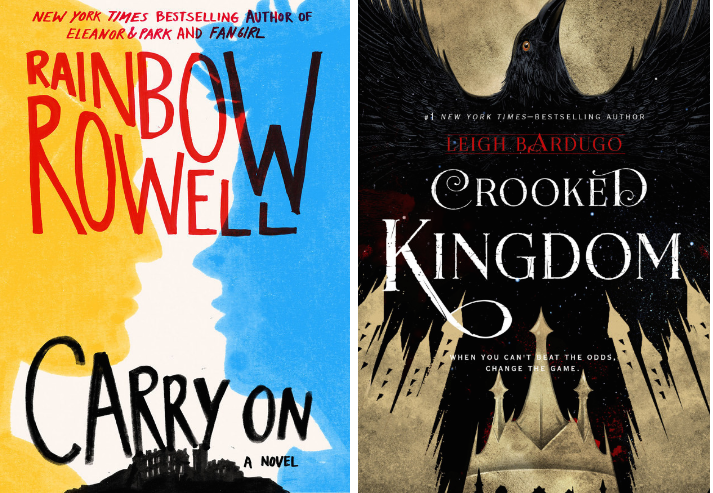Last month, authors Rainbow Rowell (Eleanor and Park, Fangirl, Carry On) and Leigh Bardugo (The Grisha Trilogy, Six of Crows, Crooked Kingdom) joined forces on a whirlwind tour of the UK and Ireland. BuzzFeed caught up with them to talk about their newest books, the worlds they create, and the kinds of characters they love to write about. Here's what they had to say:
How do you go about building original and interesting worlds for readers to explore?
Leigh Bardugo: I think when we use the word "worldbuilding" it encompasses a lot of different things, so I usually break them down into two: sense of order and sense of place. I think there’s a misconception that it applies more to fantasy than it does to contemporary. It really doesn’t. My favourite novels have a strong sense of place no matter where they are, and all of them have to give you a strong sense of order – as in, how does this place work? If I'm reading a political thriller (which I don't often do, but if I were) I need to know everyone's status and how everything works in that world.
The Grisha trilogy is set predominantly in Ravka, which is inspired by czarist Russia. And the Six of Crows books are set predominantly in Ketterdam, which was inspired by the Dutch Republic of the 1700s. For me, those cultural touchstones were just a way of creating residences in the world that I knew would speak to readers and help the world work for you. I think we’re more used to seeing it in terms of medieval fantasy tropes – we’re used to seeing medieval England, medieval Europe. I wanted to do something a little bit different but still have the advantage of harking back to things we associate with those cultures without even really realising we’re associating them.
Rainbow Rowell: Carry On is my first fantasy novel, but I’ve been a longtime fantasy reader. In fact, I've read so much fantasy that I almost felt like I couldn't do it; it seemed like it takes magic to write about magic.
But what I discovered is that when you’ve read so much fantasy you’ve really absorbed so many tropes and so many ingredients that when I went to write my first fantasy novel, they were just there for me. It actually felt very familiar to me. More familiar even than contemporary, which is about the real world, because it had been where my imagination had spent so much time my whole life. Writing fantasy was really invigorating – it was like being a cook, opening a cabinet and going, "Oh my gosh, look at all the stuff in here I get to play with, like dragons!"
What about populating those worlds? You've both received a lot of praise for your inclusive representation – was diversity at the forefront of your writing process?
LB: I’ve asked myself this question because my first book, Shadow and Bone, is a very straight, very white fantasy, and my peer group has never been particularly straight or particularly white, so I had to ask, in looking back, why that was. I think I was writing to a lot of the fantasy that I had read. It was my first foray, and it was only as I continued in that series that I found my voice and started building worlds that looked a little bit more like mine and the way I wanted the world to look.
When I wrote Six of Crows, I think I would have had to go out of my way to create a white, straight team. Ketterdam is supposed to be this international hub of people from all over the world, from all backgrounds, so it was a very organic thing. That said, making sure that that representation was respectful, and a positive versus a negative thing, was really where the deliberation came in.
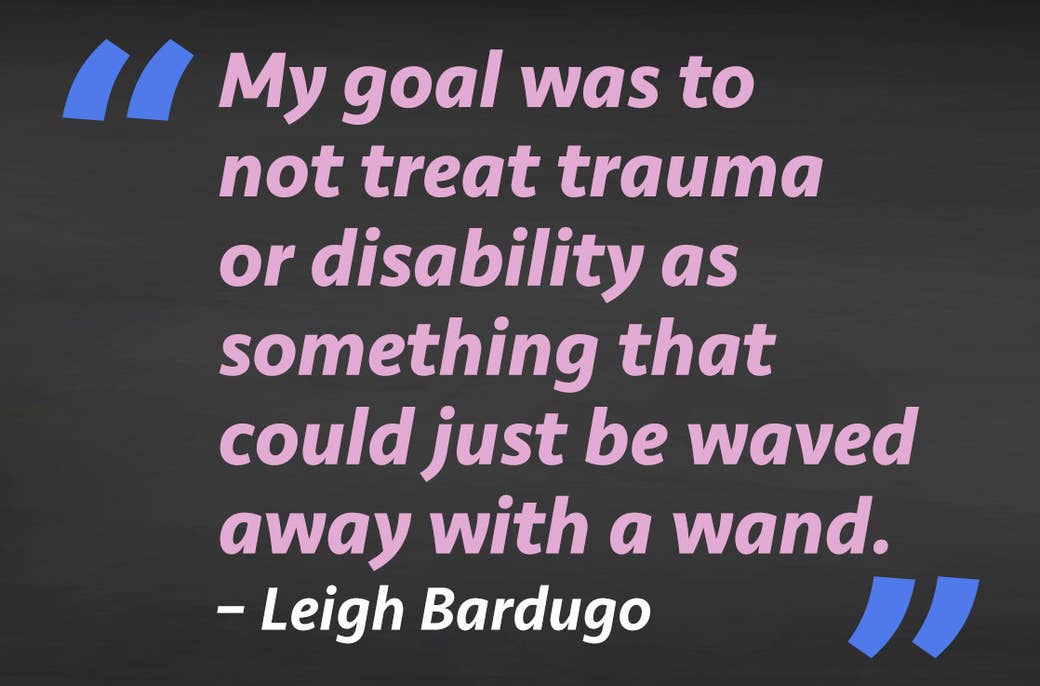
RR: I think when you grow up, when your mainstream entertainment is very homogenous, any diversity sort of gets introduced as plot. You know everybody’s straight, white, sane, and in good health unless it’s a very special episode of Blossom. Sometimes people ask me about Eleanor and Park and they say, “Did you intentionally write about outcasts?” and I think there’s just way more people like Eleanor and Park out there than whoever it is you’re visualising as a normal protagonist. It’s not for plot or a lesson, it’s just that a real character is going to bring his or identity.
You asked [if the inclusion in my books is] intentional or is it natural – I think it’s a blend. For me, I never thought, Well, I'm going to have a fat person so I can talk about fat people, or I have a message about being fat, or I'm going to write about a Korean person because I have a message about diversity. I’ve written about characters who’ve dealt with various mental illness, but it’s never been because I’ve got to make a point about OCD, for example. But that’s actually a part of who we are.
LB: So, I know this sounds implausible, but when I first wrote the first draft of Six of Crows, I didn’t think about the fact that I have a disability that I essentially gave to Kaz. I mean, we have a different source of our disabilities, but we both walk with a cane, we both live with chronic pain, and it was only in the second draft that I was like, "Oh, look what I did there."
As far as mental health goes, my real goal, in terms of Kaz and Inej and to an extent Wylan and Jesper, was to not treat trauma or disability as something that could just be waved away with a wand. I think we do a huge disservice to people – and when I say magically it could be actually magic or also just through “finding the right love” or some incredible moment of epiphany. That is not the way things get healed or dealt with.
Both of your books take a firm stance on body positivity. Can you talk about writing with the societal pressures on young women in mind?
RR: I’ve written about lots of different body types. I had a reader who told me that reading about different kinds of people in my books made her realise she’d never thought she could be the protagonist. Even in her fictional fantasies she always cast herself as the sidekick because in everything, books, movies, TV, the fat character if they're anything—
LB: They’re there for the laughs.
RR: Yeah! They’re there for the good times, they’re the Disney sidekick.
LB: And their interest in romance or adventure is often the source of humour. I hear that a lot too.
I have a character named Nina in Six of Crows – she’s heavy, she’s chubby, she’s fat, whatever word you want to use, and she is easily the sexiest member of the crew. There’s never any question about that. And the thing that actually makes me a little sad is that I’ve had a lot of people say "It's so amazing to see this," and what I don't think they realise is that that’s not a fictional creation. There’s this myth that we really buy into – that I bought into for a lot of my youth – that you could not be loved or be the object of sexual attraction [if you weren’t thin].
That’s one of the things I love most about Eleanor and Park – seeing the switch in POV from Eleanor to Park. Because Eleanor is sitting there thinking horrible things about herself, what a monster she must look like. And then you switch to Park and he’s just like “Oh my GOD, HER ZIPPER” and you know, like, YES. That's just as empowering as any attempt to be like, “love yourself” – actually experiencing that [desire] is something that doesn't happen for a lot of young women and girls until they get older, and then they realise all these things the culture is telling us is a lie. And Nina is not a fictional creation in that sense.
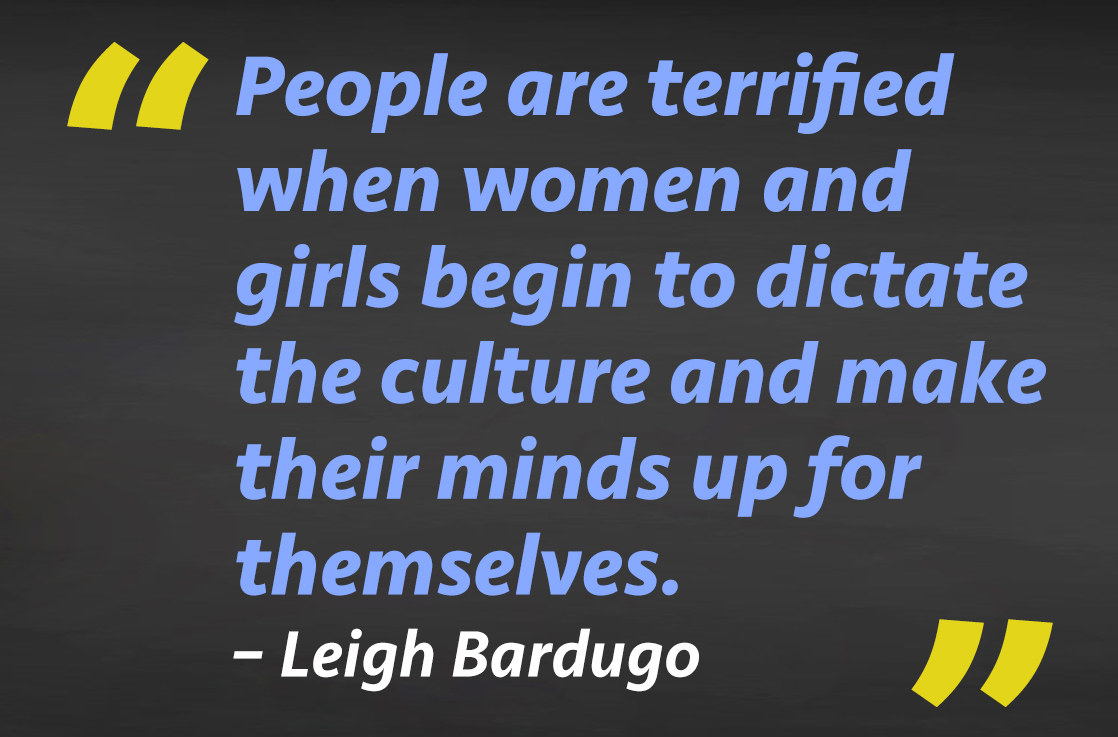
LB: OK, the fact that she can murder you without ever landing a hand on you is fictional (so we say) but the idea that you can actually be loved and be sexy and have fun and be fun and enjoy eating and not feel self-conscious about having a cake in public is not actually a myth. You can do all of those things.
Why is it so important for YA to bring issues like sexuality, body image, and trauma to the forefront?
LB: I think one of the reasons YA is so popular is because there’s a call for stories where marginalised people – especially women and girls – are not sidelined. And I don't think those books would have become popular if that desire wasn’t there. I also think one of the reasons people try to shut YA down so often, why they turn their nose up at it, is because it’s absolutely terrifying to them when women and girls begin to dictate the culture and make their minds up for themselves.
There’s a lot of discussion about the kind of things that are in YA – showing too much darkness or sadness. But when I think about the things that traumatised me as a kid it was Sweet Valley High! Because it was this vision of what my life was "supposed" to be like; it was presented as normal, but it was so different from what I was experiencing.
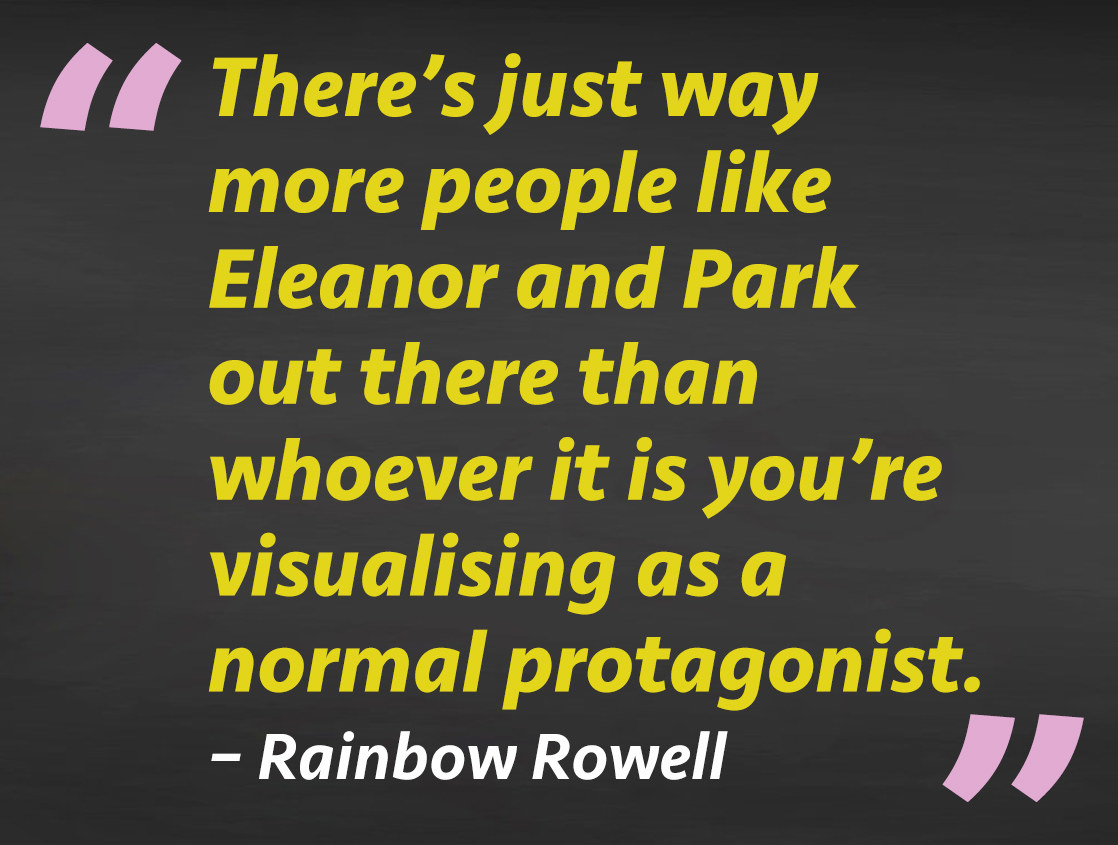
Carry On and Fangirl are love letters to fan culture, and the Grisha books have racked up a huge following over the past few years. Would you consider yourselves fangirls?
RR: I’ve always been a fan of things, I’ve always been someone who sort of inordinately either likes things – I’m very rarely like “Yeah, I liked that.” Either “I didn’t like that," or "I LOVE IT." There’s no in-between.
LB: As an adult the thing that got me into fandom was Game of Thrones – A Song of Ice and Fire. That was the first time since the advent of the internet where I was like, I'm going to seek out like-minded people. This was before the TV show, so it wasn’t like there was a like-minded person on every corner.
RR: Make sure you get that that was before the TV show.
LB: That’s right, I need my hipster GoT cred.
RR: Do you know what fandom brought me to the internet? It was Dawson’s Creek. (I will say I find that Joshua Jackson very handsome.)
What about interacting with fans of your work?
RR: Fandom is really different when we were young because of the internet. The internet has made fandom a totally different thing. But I personally had always had that in me. So I understand not necessarily why people love my stuff – but I understand why people love stuff and how they get excited. I find it great and a real source of energy to talk to people who are enthusiastic about my stuff.
LB: It can be exciting, there have been moments...and when I was working on Crooked Kingdom – I was on this crazy tight deadline – I had sort of finished working that day, and I went online and checked the tags on Tumblr, and this artist, marty-mc, had drawn a Jesper and Wylan scene that I had literally just written. It was this crazy moment of synergy. It was so beautiful, she’s so talented, and I felt so invigorated, and I had all this new energy to return to the draft.
But I will say that I feel more comfortable talking about fandoms I share with my fans – things we’re both excited about that have nothing to do with my books. Like when I find out that my readers are Hamilton fans or Brooklyn Nine-Nine fans, that makes me feel super connected to them.
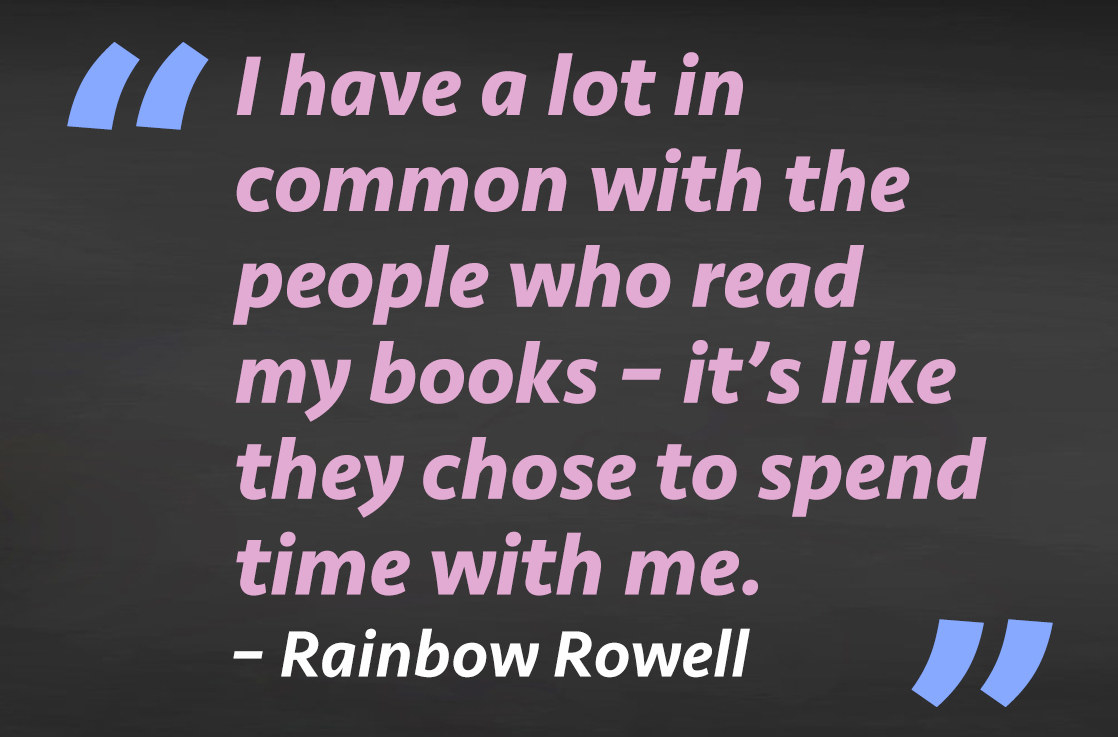
RR: I also don’t think, Here I am, and here these people are, they are my fans. What you’re finding is, often if people like your books they kind of sync up. It’s almost like you're on the same wavelength, that’s why they wanted to spend two hours with you reading your book. I find that I have a lot in common with the people who really like my books, and we do like a lot of the same other things.
It’s more like you’re approaching this person who’s not that different from you actually, and you’re sharing something. The person who’s choosing to read my books, especially more than once, they chose to spend some time with me and we kind of vibed.
Carry On and Crooked Kingdom are available to buy now.
